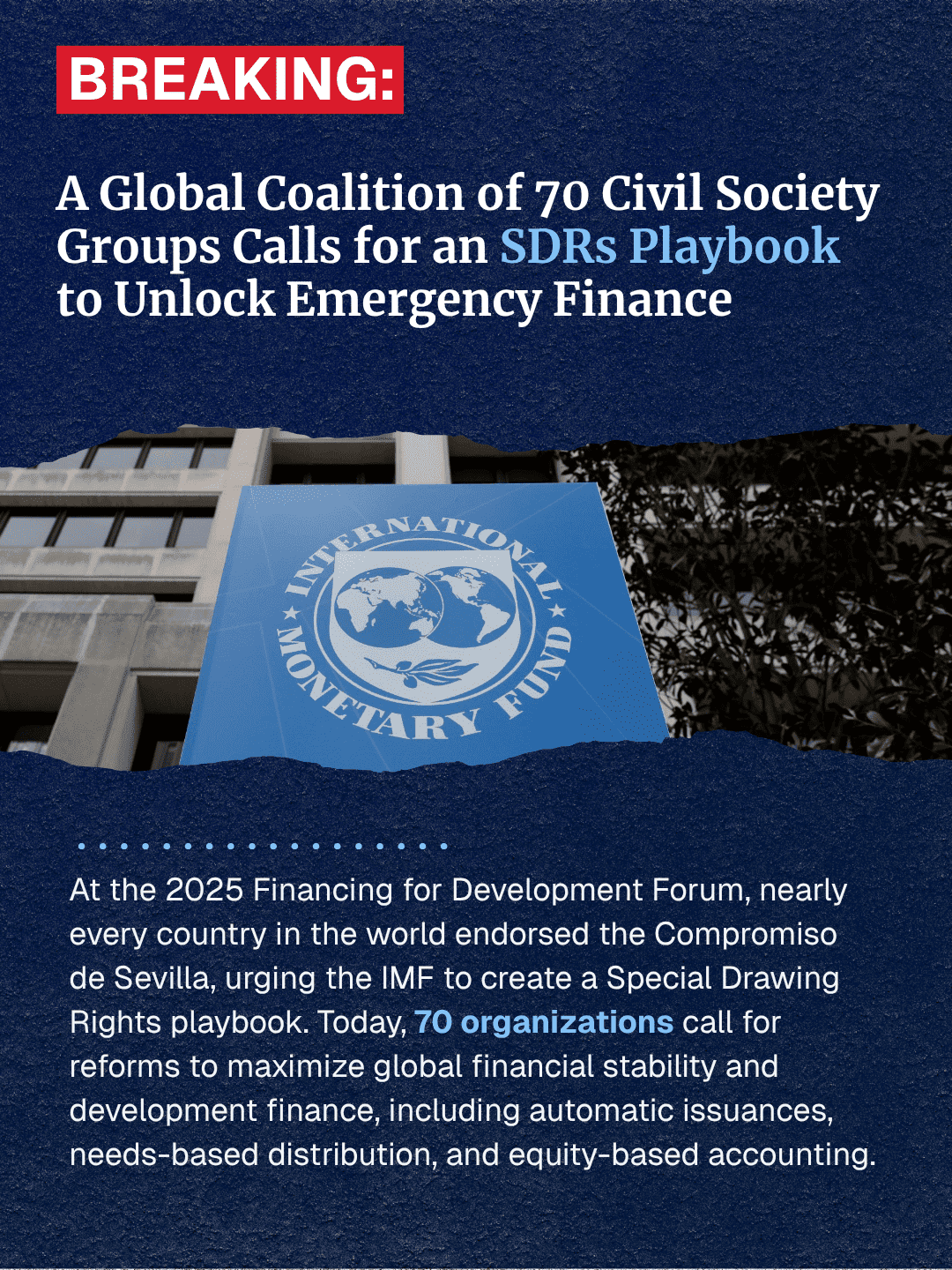MENAFem Joins 70 Civil Society Organizations Urging IMF to Fulfill Global Pledge for an SDRs Playbook
As the Annual Meetings of the International Monetary Fund (IMF) and World Bank get underway today, MENAFem has joined 70 civil society organizations from around the world in signing a letter to the IMF Executive Board urging the Fund to design a Special Drawing Rights (SDRs) Playbook “to unleash the full potential of SDRs as a tool of global financial stability and development finance.” The coalition of international development, economic justice, and humanitarian organizations endorsing the letter also include Oxfam, ActionAid USA, Christian Aid, the Center for Economic and Policy Research (CEPR), the Bretton Woods Project, CAFOD, Bread for the World, Eurodad, and Partners In Health, among many others.
MENAFem and the other groups are calling on the IMF to answer the call for an SDRs Playbook included in the Compromiso de Sevilla that was approved by nearly all UN member states at the Fourth International Conference on Financing for Development (FfD4) earlier this year. The Compromiso urges the IMF “to consider designing a special drawing rights (SDRs) playbook that provides operational guidance and strengthens the role of SDRs during crises and shocks.”
As the world faces multiple, interconnected crises — from the accelerating climate emergency and deepening inequality between Global North and South, to global economic instability fueled by unilateral actions of powerful nations — the organizations warn that the need to strengthen the global financial safety net and expand development finance “has rarely been clearer.”
The IMF’s largest-ever allocation of SDRs, $650 billion-worth in 2021, was the biggest form of development assistance that countries received during the pandemic by far. These SDRs provided a lifeline, giving developing countries critical liquidity without adding to debt or inflation enabling the funding of lifesaving health and social programs and boosting their ability to import, including from the US. Yet, despite repeated calls from governments, civil society groups, economists, and others for another major issuance, the US Treasury Department ― which holds veto power at the IMF ― has refused to support a new major allocation.
The letter notes that creating an SDRs Playbook would be key to unlocking SDRs’ full potential. It would provide practical guidance and could help design reforms to make allocations fairer and more efficient and effective, clarifying that SDRs are reserve assets rather than debt, highlighting their role in stabilizing trade during crises, and proposing regular or automatic issuances to ensure predictable access to global liquidity. It could also recommend fairer allocation mechanisms so that future SDR issuances reach countries most in need.
SDRs are an international reserve asset created by the IMF and distributed to member governments. They are not a currency, but under IMF rules, member countries that need hard currency (e.g., dollars, euros) can exchange them for these currencies.
“SDRs are a uniquely powerful tool. A new SDR issuance would provide hundreds of billions of dollars to help developing countries import more, including from the US, without costing the US a dime. Much can be done with current holdings of SDRs, but it is being held back by counterproductive accounting rules. An SDRs Playbook would help to unleash their full potential, including as an automatic stabilizer in case of crises,” Andrés Arauz, Senior Research Fellow at CEPR, said.
“Special Drawing Rights are a critical tool for countries in crisis. Governments have recognized this and called for the system to be improved so it can work better for those who are most vulnerable. For too long the IMF and a handful of rich countries have propped up a global financial system that is unjust, and stalled progress on issues that matter. Now the mandate to develop an SDRs playbook is clear. Your move, IMF,” Niranjali Amerasinghe, Executive Director at ActionAid USA, said.
“The vast majority of the IMF’s member states endorsed the Compromiso de Sevilla this summer. The Special Drawing Rights Playbook proposal reflects a growing multilateral consensus that the SDR system needs to be reformed to help address global challenges that threaten macroeconomic stability. The onus is now on the IMF’s board and management to act, and prove that the institution is capable of adapting to changing times,” Jon Sward, Environment Project Manager at the Bretton Woods Project, said.
“The SDR disbursement made during the Covid-19 pandemic helped the world to see not just the inefficiency, but the deep injustice of a system in which those most in need of a global reserve currency during a crisis receive the least — and have the least say in the decision-making to boot. After a year of intense intergovernmental negotiations, IMF executive directors were given a clear mandate in Sevilla by 192 states to develop an SDR Playbook that makes better use of this incredibly important tool for global financial stability. While we know the IMF doesn’t like being told what to do, we fully expect the IMF board to respect this intergovernmental agreement and initiate SDR Playbook discussions at the earliest opportunity,” Emma Burgisser, Economic Justice Lead at Christian Aid, said.


